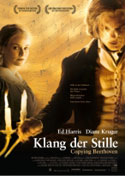

Opening 5 Apr 2007
Directed by:
Agnieszka Holland
Writing credits:
Stephen J. Rivele, Christopher Wilkinson
Principal actors:
Diane Kruger, Ralph Riach, Matyelok Gibbs, Ed Harris, Bill Stewart
In 1824 Vienna, Herr Schlemmer sends 23-year-old Anna Holtz (Diane Kruger) to Ludwig van Beethoven (Ed Harris). Her job is to transcribe or copy his 9th Symphony for the orchestra or anyone else for that matter. Time is short; the symphony – his first in ten years – is not finished; and the concert is imminent. Anna finds an old (three years before his death), disorderly, disrespectful, bossy and ill misogynist. She does her job well, even crouching in the orchestra pit to help Beethoven keep time, as he is too deaf to hear his own music while directing. The new symphony is a huge success and Anna becomes Beethoven’s permanent secretary. Her motive for staying the course in spite of his insults is that she studied composing and wants the great man to look at her work. He says, “A woman composer is like a dog walking on its hind legs: it’s never done well but you’re surprised to see it done at all.” He also comments, “Oh you have created a new genre: fartissimo, with all the little farts in your work.” Anna is tough, obviously, or she might be a bit stupid, considering her choice of boyfriend: rich arrogant Martin Bauer, the architect who is full of himself. Beethoven takes him down a notch or two. He also terrorizes his worthless nephew Karl van Beethoven, who steals in order to pay gambling debts. In the end, Anna cracks the maestro’s tough façade (“Loneliness is my religion.”) and they become friends.
This is being sold in Hamburg as a film for women. Perhaps it is a film for anyone who likes historical novels or films such as The Girl With the Pearl Earring. Even though Anna is a fictitious character, parts of the film are probably true. The London Symphony Orchestra plays ten pieces by Beethoven. Director Agnieszka Holland filmed on location in Hungary. It was interesting to see Ed Harris play Beethoven as a man who suffered from deafness, but often appeared to hear well enough. The composer supposedly could lip read, and I wonder if including a choir in his 9th symphony was just a coincidence at a time when lip reading was crucial to him. At any rate, a symphony with a choir was a brand new idea in the early 1800s, and it brought tears to the eyes of the archbishop as well as everyone else. (Becky Tan)